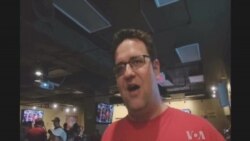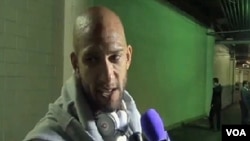The U.S. Men's National Soccer Team is getting a boost in its campaign to qualify for next year's World Cup in Brazil.
A growing legion of American soccer fans has been supporting the team as it scored crucial qualifying wins in Jamaica last week and at home against Panama on Tuesday in Seattle, Washington, before a crowd of nearly 41,000. The U.S. men face Honduras in the next qualifier in Sandy, Utah in suburban Salt Lake City on June 18.
The team's fans have become increasingly organized and visible at stadiums and bars around the country thanks to the efforts of a non-profit group called the American Outlaws. In one of their biggest mobilizations to date, the Outlaws recruited thousands of people to attend a friendly international between the United States and Germany in Washington earlier this month.
The night before the June 2 contest, hundreds gathered at the Laughing Man Tavern bar in downtown DC for the first of several pre-game parties, reuniting and exchanging stories with friends last seen at other soccer events.
The American Outlaws claim 7,000 paying members with branches in more than 80 U.S. cities, with the nation's capital being the largest. Washington, DC chapter president Justin Coughlan said other branches may be small, but have big potential.
"The U.S. sees itself as this great superpower except when it comes to soccer, which is the world's game," said Coughlan. "But the more people get into it and realize that there are other people that love it, it is going to get bigger and bigger."
Christian Allen said he set up an Outlaws branch in Greensboro, North Carolina, after several months of reaching out to local fans.
"If you get people to come to the bar and to see what we are all about and to see us chant for the USA, they really get hooked and excited," Allen said.
The excitement grew in the hours before the Germany game as more than 1,000 Outlaws and their friends joined a "tailgate" party in a parking lot next to RFK Stadium, which hosted the friendly. Tailgating is a popular feature of other sports like American football and baseball, with fans indulging in burgers and beers to get into the mood for the action.
American Outlaws national president Korey Donahoo said many U.S. soccer fans feel like outsiders in a country where the media pay more attention to bigger professional sports.
"Because soccer is not a mainstream sport necessarily, we thought 'American Outlaws' worked well for what we were trying to do," Donahoo said.
American soccer supporters also bond with each other through supporting a team that often is an underdog in the sport.
"For me, the biggest thing that sets it apart is that you see a guy in a U.S. jersey anywhere in the world and you can talk to him immediately and there is a sense of camaraderie," Donahoo said.
Chants of "USA, USA!" and "Oh When The Yanks Go Marching In" rang out as the Outlaws formed a procession from the parking lot to the stadium a half an hour before kickoff. Inside, many of them filled up a special supporters' section in the rows nearest to the field, waving their scarves, banners and flags to make themselves as visible as possible to the players, and other fans.
The U.S. men ended the first half with a surprise 2-0 lead over Germany, thanks to a powerful volley from U.S. forward Jozy Altidore and an embarrassing own goal by German goalkeeper Marc-Andre ter Stegen.
The second half began with Germany pulling a goal back through a Heiko Westermann header. But Altidore set up U.S. captain Clint Dempsey to restore the home team's two-goal advantage, which grew to 4-1 on another Dempsey goal.
Germany scored twice in the dying minutes to keep the game close, but the U.S. held on for a 4-3 upset victory, thrilling Americans in the stands, both young and old.
U.S. goalkeeper Tim Howard paid tribute to the overwhelming U.S. fan presence in the sellout crowd of 47,359.
"You know, to see a big massive stadium - a historic stadium for us, U.S. soccer-wise - to be filled and to play a team like Germany, it is special because we have not always gotten that," Howard said. "I think it is a testament to our supporters."
Second-half U.S. substitute Eddie Johnson said the national team also has benefited from the expansion of Major League Soccer, the domestic league in which he plays for the Seattle Sounders.
"Having more soccer-specific stadiums makes domestic players feel like we have a professional environment, where we feel like the sport is being more appreciated in America, and we feel more like professional athletes," Johnson said.
One of the most colorful U.S. supporters at RFK Stadium was a man dressed as superhero Captain America.
When asked what it will take for more Americans to catch on to soccer, he said the U.S. simply has to keep winning.
"You're not going to become a soccer fan overnight. You've got to apply some dedication and love for it," he said. "But soccer is great, because you're part of the game. You don't just sit and watch."
A growing legion of American soccer fans has been supporting the team as it scored crucial qualifying wins in Jamaica last week and at home against Panama on Tuesday in Seattle, Washington, before a crowd of nearly 41,000. The U.S. men face Honduras in the next qualifier in Sandy, Utah in suburban Salt Lake City on June 18.
The team's fans have become increasingly organized and visible at stadiums and bars around the country thanks to the efforts of a non-profit group called the American Outlaws. In one of their biggest mobilizations to date, the Outlaws recruited thousands of people to attend a friendly international between the United States and Germany in Washington earlier this month.
The night before the June 2 contest, hundreds gathered at the Laughing Man Tavern bar in downtown DC for the first of several pre-game parties, reuniting and exchanging stories with friends last seen at other soccer events.
The American Outlaws claim 7,000 paying members with branches in more than 80 U.S. cities, with the nation's capital being the largest. Washington, DC chapter president Justin Coughlan said other branches may be small, but have big potential.
"The U.S. sees itself as this great superpower except when it comes to soccer, which is the world's game," said Coughlan. "But the more people get into it and realize that there are other people that love it, it is going to get bigger and bigger."
Christian Allen said he set up an Outlaws branch in Greensboro, North Carolina, after several months of reaching out to local fans.
"If you get people to come to the bar and to see what we are all about and to see us chant for the USA, they really get hooked and excited," Allen said.
The excitement grew in the hours before the Germany game as more than 1,000 Outlaws and their friends joined a "tailgate" party in a parking lot next to RFK Stadium, which hosted the friendly. Tailgating is a popular feature of other sports like American football and baseball, with fans indulging in burgers and beers to get into the mood for the action.
American Outlaws national president Korey Donahoo said many U.S. soccer fans feel like outsiders in a country where the media pay more attention to bigger professional sports.
"Because soccer is not a mainstream sport necessarily, we thought 'American Outlaws' worked well for what we were trying to do," Donahoo said.
American soccer supporters also bond with each other through supporting a team that often is an underdog in the sport.
"For me, the biggest thing that sets it apart is that you see a guy in a U.S. jersey anywhere in the world and you can talk to him immediately and there is a sense of camaraderie," Donahoo said.
Chants of "USA, USA!" and "Oh When The Yanks Go Marching In" rang out as the Outlaws formed a procession from the parking lot to the stadium a half an hour before kickoff. Inside, many of them filled up a special supporters' section in the rows nearest to the field, waving their scarves, banners and flags to make themselves as visible as possible to the players, and other fans.
The U.S. men ended the first half with a surprise 2-0 lead over Germany, thanks to a powerful volley from U.S. forward Jozy Altidore and an embarrassing own goal by German goalkeeper Marc-Andre ter Stegen.
The second half began with Germany pulling a goal back through a Heiko Westermann header. But Altidore set up U.S. captain Clint Dempsey to restore the home team's two-goal advantage, which grew to 4-1 on another Dempsey goal.
Germany scored twice in the dying minutes to keep the game close, but the U.S. held on for a 4-3 upset victory, thrilling Americans in the stands, both young and old.
U.S. goalkeeper Tim Howard paid tribute to the overwhelming U.S. fan presence in the sellout crowd of 47,359.
"You know, to see a big massive stadium - a historic stadium for us, U.S. soccer-wise - to be filled and to play a team like Germany, it is special because we have not always gotten that," Howard said. "I think it is a testament to our supporters."
Second-half U.S. substitute Eddie Johnson said the national team also has benefited from the expansion of Major League Soccer, the domestic league in which he plays for the Seattle Sounders.
"Having more soccer-specific stadiums makes domestic players feel like we have a professional environment, where we feel like the sport is being more appreciated in America, and we feel more like professional athletes," Johnson said.
One of the most colorful U.S. supporters at RFK Stadium was a man dressed as superhero Captain America.
When asked what it will take for more Americans to catch on to soccer, he said the U.S. simply has to keep winning.
"You're not going to become a soccer fan overnight. You've got to apply some dedication and love for it," he said. "But soccer is great, because you're part of the game. You don't just sit and watch."






